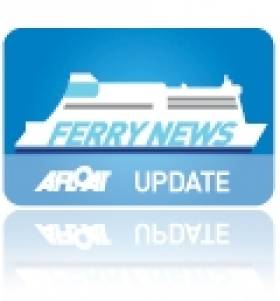Displaying items by tag: Cammel Laird
Merseyside Shipyard Workers at Cammell Laird Vote to Strike
Workers at a Merseyside shipyard which built the UK polar research ship, RRS Sir David Attenborough, have voted to strike in a row over pay and conditions.
Electricians, pipe-fitters and welders and others at Cammell Laird shipyard on Birkenhead, are building submarines and ships for the UK’s Royal Navy.
Of those workers which voted to walk-out, this was around 96%, which represents 75% of the more than 400 union members of the unions, Unite and the GMB which are taking part in the ballot.
More on the story from the Independent.
A recent caller to one of the shipyard’s dry-docks, as Afloat previously reported, was the newly introduced UK-Channel Islands ropax Conder Islander which went for repairs. The ferry has returned to Conder Ferries service and at time of writing is sailing from St. Helier, Jersey to Portsmouth.
It is from the English Channel port where the RRS Sir David Attenborough last month departed on its first Antarctica science mission to study the impact of environmental changes on ecosystems and sea ice.
The 162,000 kms ‘Swifty’ Returns to Service
#DublinSwift- Jonathan Swift, Irish Ferries fastferry returned fresh to the Dublin-Holyhead service this week, following annual drydocking maintenance in Birkenhead, writes Jehan Ashmore.
- The central corridor route, which is a distance of 60 nautical miles (111 Kms) takes Jonathan Swift only 1 hour 49 minutes while running at up to 40 knots (80kph). So with each crossing, the Dublin Swift, (her marketing name), consumes 15 tonnes of marine diesel oil and in every year she clocks up an impressive total of 162,000 kms.
As previously reported, the Irish Ferrries fleet took in turn annual dry-docking at Cammel Laird, Birkenhead, where the Austal Auto-Express 86m built catamaran craft completed in Fremantle, western Australia, became the last vessel to receive work out of the company's other Irish Sea vessels, flagship Ulysses and cruiseferry Isle of Inishmore.
Now that Isle of Inishmore is back running Rosslare-Pembroke Dock sailings, previously covered by French routes cruiseferry, Oscar Wilde, which is currently undergoing overhaul in Birkenhead.
Oscar Wilde, a former Scandinavian overnight ferry, is scheduled to launch 2013 sailings, firstly Rosslare-Cherbourg on 27 February followed by the peak-season Rosslare-Roscoff route on 10 May.
























































